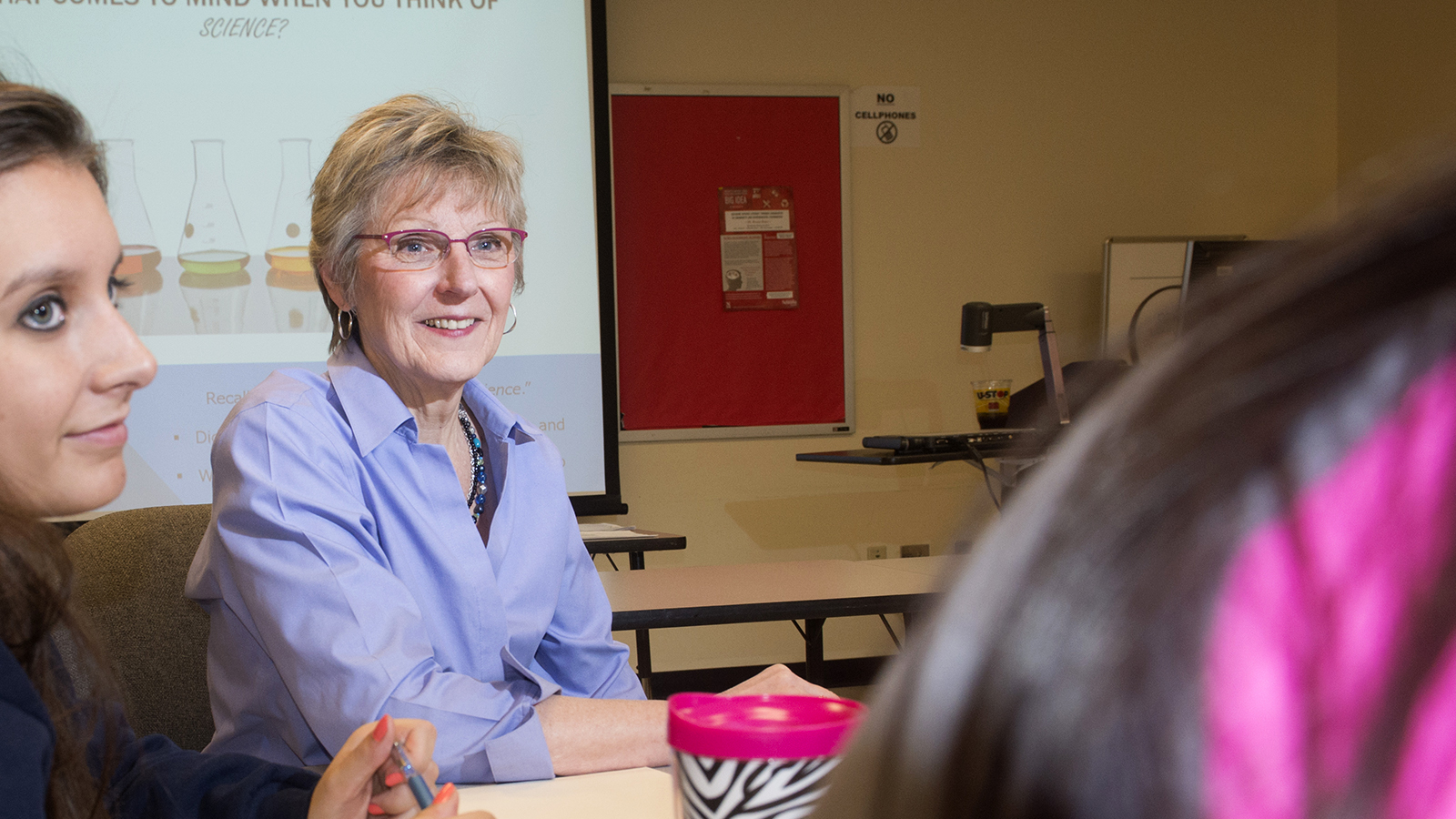
Chris Marvin retiring after 31 years in SECD
23 Apr 2019 By Kelcey Buck
Nebraska was supposed to be just a pitstop in Chris Marvin’s career. Five or six years at the University of Nebraska-Lincoln and she would move on to somewhere with the mountains and oceans she was used to enjoying. More than 30 years later, she is retiring from the job and the university she grew to love.
“When I interviewed for the job, I was kind of bummed it was in Nebraska because I had lived near mountains and I had lived near oceans,” Marvin said. “But a good friend said, ‘What were the people like?’ I said, ‘They’re wonderful. The people I’ll be working with are just outstanding. They’re bright. They’re personable. They’ve got vision.’ He said, ‘I have seen airline tickets to oceans and I’ve seen airline tickets to mountains, but I’ve never seen airline tickets advertised to good people. If you can work all day with good people, you can buy the airline ticket to the ocean.’ And he was absolutely right.”
Marvin, a professor in the Department of Special Education and Communication Disorders, started out as a speech-language pathologist. After earning bachelor’s degrees in both elementary education and speech pathology, she completed her master’s degree in speech-language pathology at Eastern Michigan University.
After college, she took a summer camp job in Minnesota. Marvin then moved on to jobs she loved in Wisconsin doing early intervention home visiting in rural communities followed by seven years at the Kiwanis Children’s Unit of the Curative Rehabilitation Center in Milwaukee, before being asked to teach full-time in the speech pathology department at nearby University of Wisconsin-Whitewater. Her one-year appointment as an instructor confirmed to Marvin that she wanted to return to a college campus and work at a university, so she moved to Oregon to pursue her doctorate.
“The reason I chose the University of Oregon in Eugene was because of the opportunity to work with a mentor whose focus had been very young children with disabilities, but not just a speech-language pathology focus,” Marvin said. “My interest over my career had always been interdisciplinary professional development – how do people who work with young children and their families learn what to do and how to work together?”
At Oregon, Marvin observed and learned about young children’s developmental opportunities and supports through a collaborative and inclusive lens.
“I chose early intervention/early childhood special education as my area of specialization and have never regretted it,” Marvin said.
Still, she always considered herself a speech-language pathologist as her core, which is what made Nebraska’s Department of Special Education and Communication Disorders a good fit for her.
When she finished her doctorate, Marvin searched for positions in higher education that would allow her to prepare early interventionists to work with children birth to age 5 with disabilities and their families. After finding limited opportunities in that area, she ended up at the University of New Mexico, preparing K-6 educators to work with speech-language pathologists in the schools. When a faculty position at the Nebraska was brought to her attention, Marvin was interested.
“When I came here to interview I was so impressed,” Marvin said. “It was a dream come true because I would be able to build a professional development program that could be interdisciplinary in focus about children under 5 with disabilities and their families.”
The professional opportunities outweighed any issues she had with the geography, and Marvin moved to Nebraska for what ended up being the last stop in her career.
Regardless of what phase of her career she is talking about, Marvin circles back to the impact the families she has worked with have had on her. It motivated her as a practitioner, and it continued to motivate her as she trained future practitioners at Nebraska. For more than 20 years, Marvin even had a parent of a child with disabilities as her co-instructor in at least one of her graduate courses each year.
“I had the opportunity in all of my jobs, regardless of my responsibilities or title, to work with some fascinating families,” Marvin said. “These families were so dedicated to doing the best they could with their child that you couldn’t help but want to be part of their team. To have them say that I helped in some way meant a lot. I wanted others to have that same feeling.”
Marvin also found joy in working with the students at Nebraska.
“I’ll miss the opportunity to mentor young adults in blazing the trail for themselves on what they want to do,” Marvin said. “They come in with passion that they want to help people. They don’t even know how to articulate it. They’re just helpers. I have really enjoyed being able to help them find the right major, find the right job, and make decisions that allow them to have both a career they’re pleased with and a life that’s balanced and satisfying.”
As she heads toward the finish line of her career, Marvin encourages those just getting started in the early intervention or early childhood special education profession to always make the people they’re working for their priority.
“Remember who you’re working for,” Marvin said. “It’s not about our goals. It’s not our vita that should be foremost in our minds. It’s whether or not families and children are benefitting from what we do, hopefully sooner than later.”
Special Education and Communication Disorders